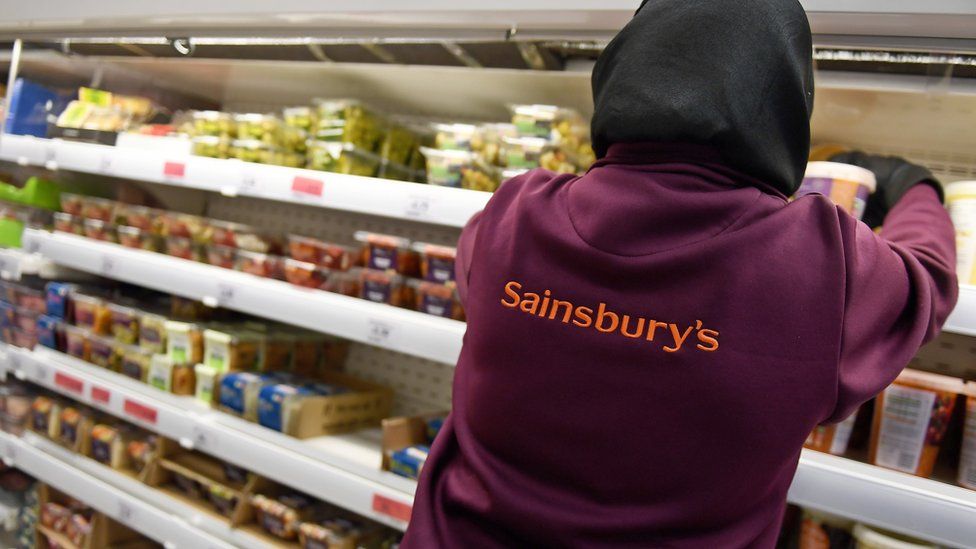Suppliers fear Sainsbury's price squeeze after Asda deal
- Published
- comments

Companies that supply products to Sainsbury's and Asda fear they could suffer when the two grocery chains merge.
Sainsbury's boss Mike Coupe has pledged to cut prices on everyday products by around 10% after the deal.
But suppliers fear they will have to shoulder the cost of those savings.
"There will be plenty of losers from this," said Austin Sugarman, boss of Fine Foods International, a supplier of instant coffee based in Bedfordshire.
"If suppliers are going to have to come up with the savings, then we'll see consolidation in the supply base," he told the BBC.
"That means closing factories, that means losing people and it means effectively less choice for consumers."
Mr Coupe said the combined group's buying power would enable it to strike better deals with suppliers, and these savings would then be passed on to consumers.
But industry bodies fear this will make life very difficult for smaller suppliers, who are already having to adapt to higher costs from auto-enrolment pensions and the Living Wage, as well as the weaker pound since the Brexit vote.
"We already operate in a very competitive retail environment," said Gordon Polson, director of the Federation of Bakers. "We just don't see possibly how our products could be reduced any further."
Ian Cass, managing director of the Forum of Private Business agreed: "If suppliers are asked to reduce prices by 10% to stay on the Sainsbury's-Asda supply chain, then some small companies could go out of business."
Mr Cass was concerned that the combined company - which will be Britain's biggest grocer - could seek to pressure suppliers into unfavourable terms by holding the threat of losing contracts over their heads.
He cited Arcadia Group, which owns brands such as Topshop and Dorothy Perkins as an example. In January, the firm imposed a 2% discount on all current and existing orders from suppliers due to poor Christmas sales.
On top of all these pressures, suppliers also have to contend with the fact that many retailers in the grocery industry make suppliers wait up to three months for payment.
"Surely there are other efficiencies you could make in partnership with suppliers, other than turning around and demanding a 10% discount," Mr Cass said.
A better deal?
Sentinel Management Consultants acts as an adviser to suppliers on their negotiations with supermarkets.
It said that while some suppliers will undoubtedly be "quaking with fear" after the Sainsbury's-Asda merger announcement, others will have more power to negotiate with the new firm than they realise.
"Suppliers need to get better at saying no," said Sentinel boss David Sables.
"Supermarkets don't want to have complaints from shoppers because their favourite crisps, biscuits, coffee or soap powder have come off the shelves."
Mr Sables said small businesses should make sure they understand their rights under the Groceries Supply Code of Practice, and also understand that supermarket chains tend to hold the threat of getting rid of suppliers as a bluff.
"There is a game being played about the demand for cheaper prices, and very often when suppliers have said no and they're walking away, nine times out of 10 that's the price they get the contract to supply at."
A Sainsbury's spokeswoman told the BBC that suppliers would benefit from the deal.
"At this stage, we are still in the early phases of our plans but we believe this is a great opportunity for suppliers as they will be able to make their supply chains more streamlined, to develop differentiated product ranges and to grow their businesses as we grow ours.
"We are also actively investing in small suppliers - we are recruiting a team which is dedicated to working with smaller and distinctive suppliers to help them bring new products to market and to handhold them through this process."
- Published1 May 2018
- Published30 April 2018
- Published30 April 2018